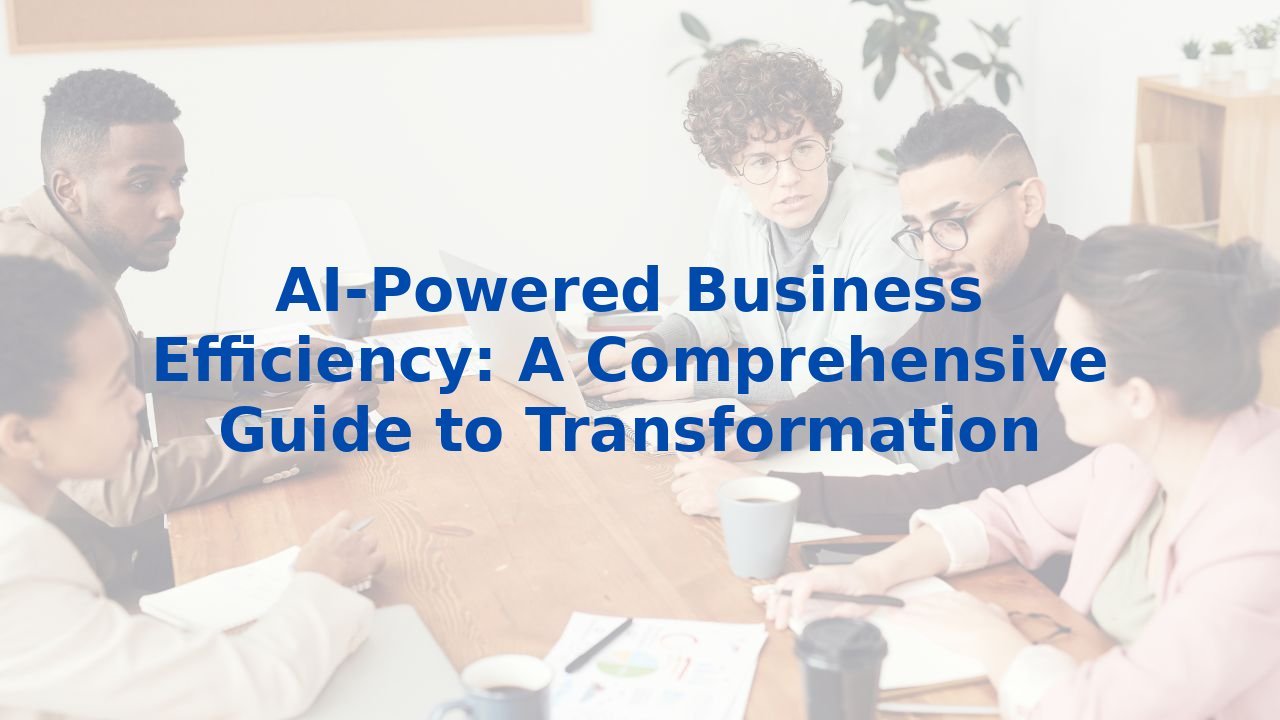AI-Powered Business Efficiency: A Comprehensive Guide to Transformation
AI-Powered Business Efficiency: A Comprehensive Guide to Transformation
In an era where business agility is paramount, Artificial Intelligence (AI) stands out as a monumental force for transformation. Organizations everywhere are awakening to the potential of AI to elevate efficiency, automate mundane tasks, and drive forward innovation. These changes are not merely incremental; they are paradigm-shifting. In this guide, we will explore how AI enhances essential business processes and elucidate the profound benefits it brings to organizations eager to thrive in the modern landscape.
Automating Routine Tasks
Imagine a world where repetitive tasks no longer bog down your team. With AI-driven automation, this dream transforms into reality. By employing intelligent document processing (IDP), businesses can automate the handling of documents and data entry tasks. No longer will your employees spend endless hours on low-value work. Instead, automation allows them to refocus their efforts on strategic and innovative challenges, ultimately fostering a culture of creativity and productivity.
Improving Decision Making
AI empowers teams to make decisions backed by data. Through predictive analytics, AI uncovers patterns from historical data, enabling organizations to simulate various scenarios. For instance, businesses can explore how pricing adjustments might affect profits, providing them with the insights necessary to make informed and effective pricing decisions. The capacity for proactive decision-making transforms organizations from reactive to strategic leaders in their industries.
Streamlining Business Processes
Business processes often experience friction, leading to inefficiencies. Enter AI, with its process mining capabilities that analyze operational data to visualize workflows clearly. By identifying patterns and potential bottlenecks, organizations can take decisive actions to optimize their processes. Imagine being able to intervene in real-time when anomalies arise, ensuring operations remain both effective and efficient.
Enhancing Customer Service
The nexus between AI and customer service cannot be overstated. AI operates as a powerful ally, automating basic inquiries through chatbots that both streamline communication and enhance the customer experience. These systems not only improve response times but also free human customer service representatives to handle more complex queries. In an increasingly competitive landscape, customer satisfaction becomes a crucial differentiator, and AI plays a vital role in delivering superior service.
Optimizing Supply Chains
Supply chains are the backbone of many businesses, and their optimization is essential for success. AI applications in supply chain management can analyze real-time data to identify issues and alert relevant teams promptly. By integrating with robotic process automation (RPA), organizations can automate tasks such as inventory reordering, leading to more efficient stock management and reduced operational headaches. This level of agility ensures that businesses can respond to market demands swiftly.
Supporting HR Functions
AI's impact on Human Resources is reshaping how organizations manage talent. By utilizing AI to analyze performance data, budget constraints, and market trends, HR teams can craft competitive salary offers with greater fairness. Furthermore, automating repetitive HR tasks allows for a more personalized approach to career development, ensuring employees feel valued in their roles.
Enhancing Sales Processes
In the realm of sales, AI improves processes by streamlining lead scoring, content drafting, and even sales channel recommendations. AI-powered systems personalize the customer journey, ensuring that potential clients receive attention tailored to their specific needs. This level of customization drives both engagement and sales, ultimately resulting in a healthier bottom line.
The Benefits of Training Employees for AI
While introducing AI technologies is a monumental step, the true transformation occurs when employees are equipped to collaborate with these systems. Training has several significant benefits:
- Faster Adoption: Well-trained employees adapt quickly to new AI tools and processes, accelerating organizational implementation.
- Improved Efficiency: Employees armed with AI knowledge can optimize their workflows, enhancing productivity and decision-making.
- Enhanced Problem-Solving: By understanding AI's functions, teams can identify operational challenges quickly, minimizing downtime and maximising effectiveness.
- Better Collaboration: Training fosters alignment among teams, ensuring everyone operates towards shared organizational goals.
Conclusion
The integration of AI into business workflows is more than just a trend—it’s a crucial evolution in the quest for efficiency. By automating tasks, enhancing decision-making, and streamlining operations, AI serves as a catalyst for transformative change in businesses across all sectors. Moreover, prioritizing employee training ensures organizations unlock the full potential of AI technologies, fostering a work environment ripe for growth and innovation.
In a world that demands agility and innovation, embracing AI is not merely an option; it’s a necessary step forward. Whether it’s bolstering customer service, optimizing supply chains, or enhancing sales strategies, AI offers a comprehensive roadmap for businesses aiming to navigate the complexities of today’s markets. Harness its power, and watch your organization thrive.



